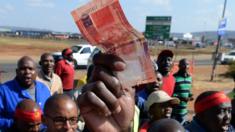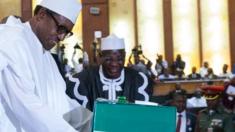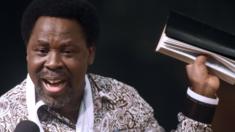
- 24 February 2016
- Africa
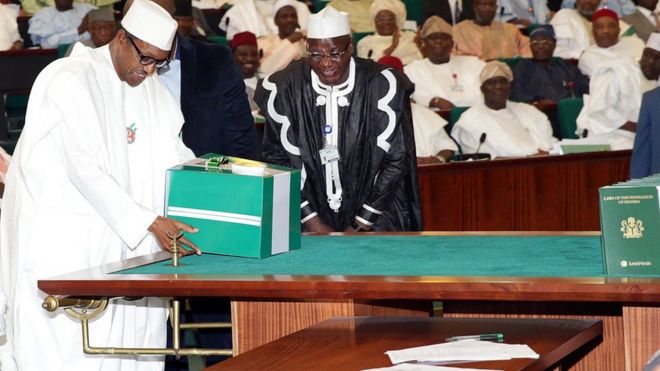 Getty Images
Getty Images
In our series of letters from African journalists, novelist and writer Adaobi Tricia Nwaubani looks at the trouble Nigeria is having balancing the books.
Whatever criticism you may have of President Muhammadu Buhari, his administration cannot be accused of being dull.
Week after week, some new action on the government stage causes eyeballs to bulge.
Even those newspapers which typically scream front page headlines such as: "Friend Kills Friend Over Girlfriend" now have more than enough government activity to meet their customers' needs for sensationalism.
The budget fiasco was the latest drama to unfold, and it came with a diverse cast of characters.
First on the stage was President Buhari. Out he marched in late December, superintendent straight, stern-faced, to present Nigeria's 2016 $31bn (£21bn) budget to the National Assembly.
With great fanfare, the Senate received the boxed document, gave a resounding round of applause, and even got the man at the top to crack a grin.
It was an occasion worth celebrating, indeed.
Adaobi Tricia Nwaubani:
 Adaobi Tricia Nwaubani
Adaobi Tricia Nwaubani
"The amount budgeted for books for the vice-president's office far exceeds that for some of the country's major universities"
The first time in as long as anyone can remember when the country's annual budget was ready before the middle of the year.
It was also the first in three years that a Nigerian president had personally presented a budget to the National Assembly.
Former President Goodluck Jonathan usually dispatched his finance minister to perform the duty.
In addition, the budget was made available online for citizens who so wished to freely scrutinise.
Who says Nigeria is not progressive?
Having thus made history, President Buhari exited the stage to go and continue chasing after the men and women who have been accused of spending the past few years stuffing their bellies full with funds meant for the war against Boko Haram militants.
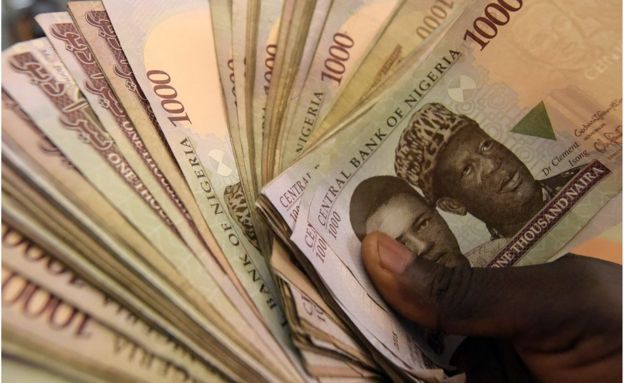 Alamy
Alamy
With each new day, his trawl seems to drag in a new high-profile culprit. What a true brotherhood the multitude of alleged thieves must have shared.
There was a brief subplot when the budget went missing from the National Assembly, when no-one could trace the document presented by the head of state.
But that matter was quickly resolved and a fresh document found its way from the State House to the senators.
Once again, all was well with the world.
So what if there were some slight differences between the original document which disappeared and the new one? The show had to go on.
In a detailed analysis, the online news site Premium Times excavated some alarming figures from the budget, showing for example that the total amount budgeted for the State House clinic which serves just a few people, far exceeds that for some of the country's major hospitals which serve millions.
In addition, the amount budgeted for books for the vice-president's office far exceeds that for some of the country's major universities.
Yes, Vice-President Yemi Osinbajo is a professor of law. We know the learned folk like to read, but still.
On and on the alarming discoveries continued.
Nigeria at glance:
- Africa's largest economy and most populous nation
- Oil rich, but facing worst economic crisis in years after falling oil prices
- 46% of its more than 170 million population live in poverty
- Average annual earnings - $2,970 (£2,117)
None of this was in keeping with the president's well-publicised austere nature.
Even the presidency appeared speechless and confused.
'Budget mafia'
The office was still struggling to understand the situation when the government ministers took the stage.
Next thing, the Senate discovered a questionable sum of 10bn naira ($50m, £35m) "smuggled" into the budget of the ministry of education.
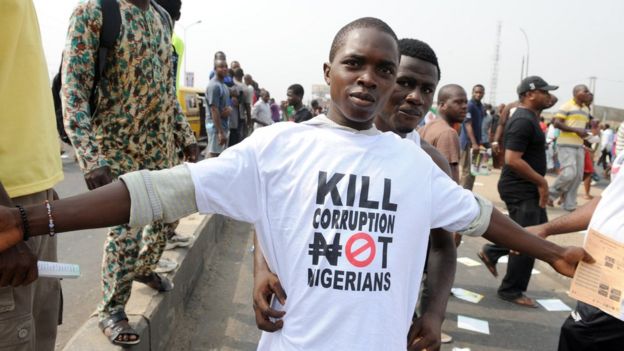 Getty Images
Getty Images
Then Health Minster Isaac Adewole expressed shock at the figures for his ministry, which he was expected to defend in parliament.
"This was not what we submitted," he said. "We'll submit another one".
With that, the mystery of the State House budget was solved.
Apparently, while President Buhari was busy poking alleged looters out of their holes, a "budget mafia", in the words of an unnamed presidency source and thought to refer to some civil servants - had padded out his budget with a few billion naira, which he knew nothing about.
Like most good dramas, the budget fiasco is not only about entertainment.
It has a moral at the end. The director of the budget office has been sacked.
And thanks to this tale of bloated figures and discrepancies, President Buhari now knows that his famous war on corruption must extend beyond big names and past governments.
The looters are within his camp as well as without.
More from Adaobi Tricia Nwaubani:
- Why rat poison is big business in Nigeria
- Cutting Nigeria's 'big men' down to size
- Nigeria's disappearing storytellers
- How Nigerian politics rivals Nollywood for drama
